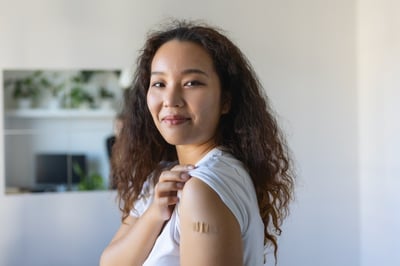Categories Prevention



Relevance: Medium
Most relevant for: People with an inherited mutation in BRCA1 or BRCA2 concerned about their breast cancer risk
Study: Weight may affect breast cancer risk in women with an inherited BRCA mutation
A study that looked at normal breast cells from women with an inherited BRCA mutation found more DNA damage among women who were overweight (based on a measurement known as body mass index) than those who were not overweight. The results suggest that maintaining a lower weight may reduce breast cancer among this high-risk population. (Posted 3/30/23)
Este artículo está disponible en español.
READ MORE ›


Relevance: Medium
Most relevant for: Healthy people at high-risk of ovarian cancer.
Study: Frequent aspirin use may reduce the risk of ovarian cancer
Aspirin may help lower the risk of ovarian cancer in people who have a high risk of the disease, according to a new analysis of 17 studies. While other preventive strategies have been found to more effectively lower the likelihood of developing ovarian cancer in high-risk women, taking aspirin daily or almost daily may reduce a person’s risk of developing ovarian cancer by 13 percent. The benefit was greater among people with additional risk factors for the disease. (Posted 2/22/23)
Este artículo está disponible en español.
READ MORE ›


Relevance: Medium
Most relevant for: People with a BRCA1 or PALB2 mutation undergoing prophylactic bilateral mastectomy
Update: Breast cancer vaccine trial begins enrolling people with BRCA1 and PALB2 mutations
A new vaccine was first tested on people diagnosed with triple-negative breast cancer. The vaccine is now being tested to prevent breast cancer among people with an inherited mutation in BRCA1 or PALB2 who are at high risk and who are planning to have a risk-reducing mastectomy. (Posted 1/9/23) Este artículo está disponible en español.
READ MORE ›


Relevance: Medium-High
Most relevant for: People with Lynch syndrome and people with a personal and/or family history that suggests Lynch syndrome
Study: Resistant starch may help prevent some cancers in people with Lynch syndrome
This study looked at whether a type of nutrient known as resistant starch could lower the risk of cancers in people with Lynch Syndrome. Researchers found that resistant starch can reduce the risk of non-colorectal cancers but not colorectal cancer. (Posted 10/17/22)
Este artículo está disponible en español.
READ MORE ›


Relevance: Medium-High
Most relevant for: People with an inherited BRCA mutation
Study: Risk-reducing ovarian cancer surgery and quality of life
People with an inherited BRCA gene mutation are recommended to have surgery to remove their ovaries before the age of natural menopause to reduce their risk of ovarian cancer. This surgery can cause short-term and long-term effects. This study assesses the quality of life among people who have their fallopian tubes surgically removed and later have their ovaries removed compared to people who have their ovaries and fallopian tubes removed at the same time. (Posted 7/26/22). Este artículo está disponible en español.
READ MORE ›


Relevance: Medium-High
Most relevant for: Transgender men with an inherited mutation
Article: Breast cancer risk for transgender men with inherited mutations
There is little information related to the risks and treatment options for transgender men and nonbinary people who are at high-risk for breast cancer due to an inherited BRCA1 or BRCA2 mutation. We review an expert viewpoint on the implications of a BRCA mutation for transgender men undergoing breast removal as part of their gender-affirming care plan. (posted 5/19/22)
Este artículo está disponible en español.
READ MORE ›


Relevance: High
Most relevant for: People with genetic test result called a VUS
Article: Chris Evert's ovarian cancer diagnosis highlights the importance of genetic counseling and testing
Tennis star Chris Evert shared her story about a change in her sister's genetic test results that led Ms. Evert to have genetic testing and her decision to have her ovaries removed to lower her cancer risk. Ovarian cancer was found at the time of Ms. Evert’s surgery, but fortunately, it was caught early. Her story highlights the importance of genetic counseling, testing and post-testing follow-up with experts. (Posted 2/8/22). Este artículo está disponible en español.
READ MORE ›


Relevance: High
Most relevant for: People with BRCA1 or BRCA2 mutations
Study: Mutations in BRCA1 or BRCA2 may increase risk for endometrial cancer
A Dutch study added further evidence that women with a BRCA1 mutation may have an elevated risk for endometrial cancer. The study found that the endometrial cancer in women with either a BRCA1 or BRCA2 mutation was more likely to be an aggressive form of cancer associated with a poor outcomes. (posted 11/30/21)
Este artículo está disponible en español.
READ MORE ›


Relevance: Medium
Most relevant for: Healthy people with an average colorectal cancer risk
Study: Do sugared beverages increase the risk of early-onset colorectal cancer?
A study of female nurses in the U.S. suggests that a high intake of sugar-sweetened beverages may increase the risk of colorectal cancer before age 50. However, researchers saw few early-onset colorectal cancer cases which limited the findings. (posted 9/21/21)
Este artículo está disponible en español.
READ MORE ›


Relevance: High
Most relevant for: People concerned about endometrial, ovarian or breast cancer risk
Study: Birth control pills may offer long-term protection against endometrial and ovarian cancer
A large study showed that birth control pills may protect against endometrial and ovarian cancers, even years after use was discontinued. (posted 6/1/21)
Este artículo está disponible en español.
READ MORE ›